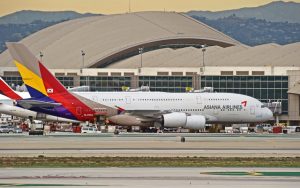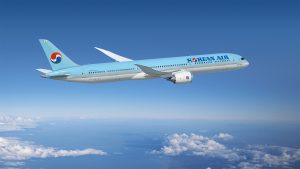Korean Air Takes Over Asiana Airline
Vivian Haas
International Business Writer
On November 16th, 2020, the Korean Government officially announced that Asiana Airlines will be acquired by Korean Air. Asiana Airlines is a major airline that accounted for 25% share of the international market and 20% of the domestic market in 2019 and is a rival company to Korean Airlines. Due to the COVID-19 pandemic, both companies have been facing server losses, Asiana Air experiencing the hardest hit to their revenue. Korean Air bought out Asiana Airlines for 1.8 trillion won ($1.62 billion) in order to consolidate the global aviation sector. The deal combining South Korea’s two biggest airlines resulted from the low flight demand, excessive spending, and grounding planes to survive due to the pandemic.
Korean Air’s decided to acquire Asiana Airlines in the middle of a pandemic in an attempt to stabilize the Korean aviation industry and expand its reach to be ranked as one of the top ten airlines in the world. This acquisition will allow Korean Air to compete more effectively with regional rivals and international rivals as well. Korean airlines stated that with creating a single major airline, Korea will no longer have a competitive disadvantage to countries who have single major airlines like Germany, Singapore, and France. Despite the advantages Korean Air has brought up, many customers are raising concerns about this new acquisition deal.

With Korean Air’s rival company being bought out by them, many customers are concerned with a potential increase in prices. Since there is no longer competition between the two rivals, Korean Air will no longer have to lower prices in order to attract customers. The concern of monopolizations includes the possibilities of increased prices, adjustment of air routes, and customer convenience. In addition, customers who were a part of Asiana Airlines’ membership reward program are concerned that their mileage points will no longer be applicable once the company is taken over by Korean Air.
To combat these concerns, the government reported that customers can benefit from the adjustment of air routes and that the government vowed to take appropriate measures to protect consumers. Kim Sang-do, a senior official in charge of aviation policies at the Ministry of Land, Infrastructure and Transportation stated that Korean Air will put efforts into exploring new air routes that could save money and will not focus on removing money-losing routes. Furthermore, in regard to increased ticket prices, Sang-do noted that there will be no increase in ticket prices due to the fact that Korean air still has to compete with international airlines and LLC. In addition, Korean Air cannot sharply raise the cost of international airline routes due to an upper limit that has been set through an international agreement, disregarding this agreement could bring about trouble for the airline. Regarding consumer concerns about losing mileage points at Asiana Airlines, the transportation ministry said that membership reward programs will be combined with Korean Air’s reward program once the takeover is completed. However, the two reward programs will not be integrated at a one-to-one ratio, especially since Korean Air’s points have been valued higher in the market then Asian Airlines points.

Despite consumer concerns, Korean Airlines states that this acquisition was inevitable considering the detrimental effect the pandemic has on all airlines. Asia Airlines has long been plagued by financial problems, prompting parent company, Kumho Industrial, to start selling stock to keep up with creditor demand. Before Korean Air bought Asiana Airlines, a previous deal for South Korean builder HDC Hyundai Developer was set in motion to acquire Asiana. However, due to the pandemic decimating the aviation industry, the deal collapsed in September. With this restructuring of the domestic aviation market, Korean Air will be able to enhance their competitiveness with other global mega airlines.
Many of the country’s transport ministry and Asiana’s creditors see this new development as unavoidable to prevent greater losses during the pandemic. However, if Korean Air continues to suffer from the COVID-19 pandemic, it is possible for the company to be in danger despite this new acquisition deal. Overall, Korean Air hopes to turn the tide on the negative effects the pandemic brought to the transportation industry and prosper in the future.
Contact Vivian at haasvivi@shu.edu

